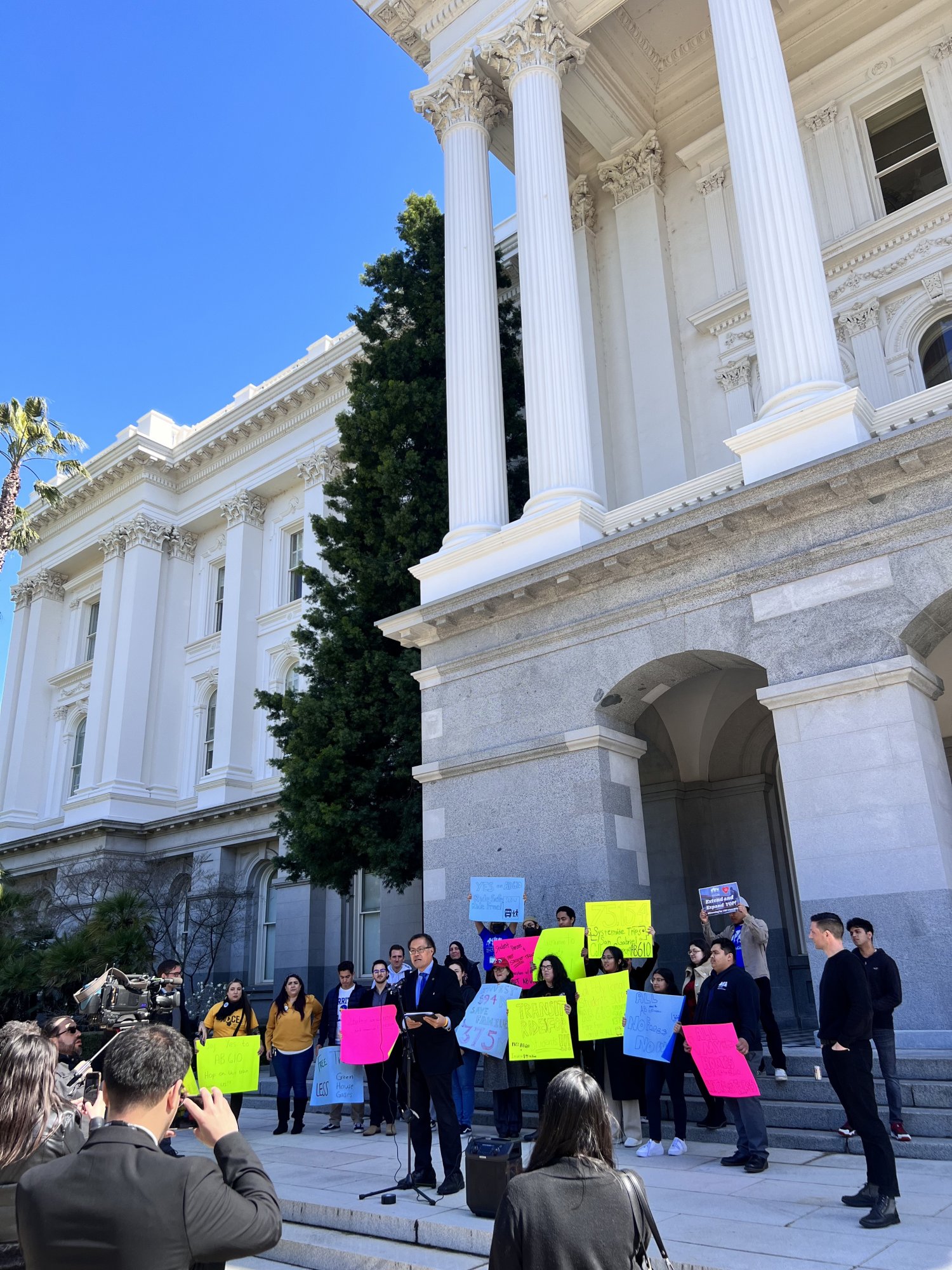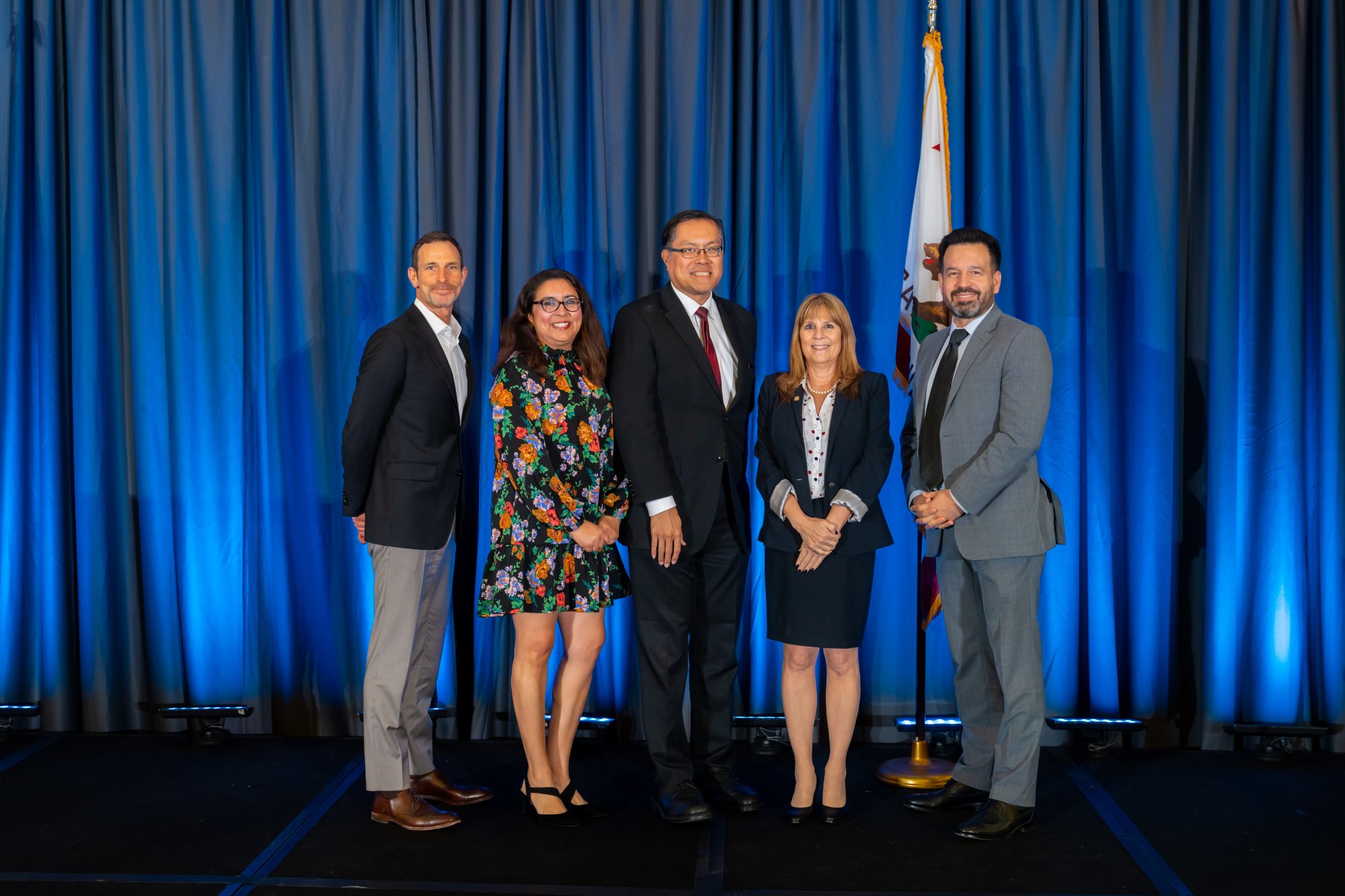In this issue:
- Budget hearings
- Focus of 2023 legislation
- AB 610: Transportation passes for all students
- California community colleges' visits to Washington, D.C.
- Baccalaureate degrees
- Legislative Conference recap
Budget hearings commence/Legislative Analyst’s Office releases CCC budget brief
A month after Governor Newsom introduced his 2023-24 spending plan, the budget season began in earnest with the start of legislative hearings and release of the Legislative Analyst’s Office (LAO) brief on community colleges.
The Assembly’s inaugural budget hearing on higher education took place on February 21, which covered the Governor’s proposals for all three public segments: University of California (UC), California State University (CSU) and California Community Colleges (CCC). Alongside representatives of the Department of Finance and LAO, the respective heads of each of the systems testified as to the strengths and weaknesses of the Governor’s plan.
With respect to community colleges, the LAO representative noted that the federal metric upon which the state’s estimated Cost of Living Adjustment (COLA) is based has risen in the last quarter from 8.13 to 8.40 percent. That said, the LAO explained that the state did not currently have the resources to fund above the proposed 8.13 percent level and may possibly be in a worse financial position by the time of the May Revision.
Aside from COLA, enrollment and housing were the two dominant hearing themes for CCCs. Echoing the sentiment in the Governor’s proposal, legislators expressed concern over lagging enrollment, notwithstanding the system’s achievements in student success. This topic undoubtedly will take center stage at subsequent hearings in the budget process.
There was also a robust discussion on housing, with several Assemblymembers opposing the Governor’s proposed delay of $250 million for this purpose. More troubling from the perspective of the CCCs were comments by some legislators favoring the UC and CSU over the community colleges as a priority for state housing funds.
The League’s Government Relations Director, Andrew Martinez, testified in public comment on the League’s support for the proposed COLA and opposition to the Governor’s proposed redirection of $200 million from Deferred Maintenance toward Enrollment Strategies.
A day after the Assembly hearing, the LAO released its analysis and recommendations on the community college budget, which followed up on earlier briefs on higher education and Proposition 98. In its report, the LAO concurred with the League against redirecting $200 million from Deferred Maintenance to Enrollment Strategies. “We recommend the Legislature effectively retain those funds for facility maintenance projects, as most of those funds already have been distributed to districts and committed to projects that would reduce their maintenance backlogs,” the LAO said.
The LAO brief also devoted considerable attention to an ambiguity in the statute on stability funding, which applies to districts experiencing a drop in enrollment. This has created a different interpretation by the Department of Finance, which has no districts eligible for this funding, and the Chancellor’s Office, who would allow 42 districts to be qualified. As such, the LAO “recommend[s] the Legislature modify statute to clarify the intent of stability funding and how it is to be calculated.”
League staff and leaders are currently meeting with legislators to promote community college funding, highlighting the principles of stability, predictability, and flexibility. Follow the League’s online budget advocacy page and social media for updates on budget developments and future hearings.
Focus of 2023 legislation
With the deadline to introduce legislation passed, we now have a better understanding of issues the legislature will focus on this year. Over the past several months legislators introduced over 2,700 bills impacting nearly every aspect of life in California. The legislature is expected to debate major issues ranging from homelessness and healthcare to housing and high oil prices.
League staff have tagged close to 100 bills as related to community colleges. As expected, the legislature has taken an interest in subjects diverse as collective bargaining, governance, and student health (descriptions of specific bills and links to their language are below). Legislators appear to have taken an unusual interest in both issues impacting employee relations and providing emergency drug overdose to students as they have introduced a high number of bills for each subject this year.
Additionally, there have been several bills that are either non-substantive or state the intent of a legislator to investigate an issue. League staff will work to determine how these bills will impact California’s community colleges. The League’s website has a full list of introduced bills that impact community colleges.
Regardless of their subject matter or impact on community colleges, all legislation will be considered in the context of the budget. With California facing relatively flat or a small increase in state tax revenue, there will likely be fewer resources than in the past several years for the state to implement new programs. Thus, League staff expect that it will be more difficult for advocates to push for new programs that might benefit their constituents.
Collective Bargaining:
AB 260 (Santiago) Community Colleges: Part-Time Employees
Requires the ratio of pay for part-time faculty members to be equal to their full-time colleagues. This is a requirement upon receipt of funds allocated for student success categorical programs and thus would not be a reimbursable mandate. View AB 260.
AB 472 (Wicks) Compulsory Leaves of Absence
Among other items, would require schools and community colleges to fully compensate an employee for lost wages if that employee was placed on unpaid leave due to an investigation into criminal or administrative charges, but the investigation was found in the employee’s favor. View AB 472.
AB 1190 (Irwin) Part-Time Faculty Office Hours
Would require community college districts to provide compensation for office hours to part-time faculty at an amount equal to one paid office hour for every 2 classes or more taught per week by the part-time faculty member or 40% of a full-time load and ½ paid office hour for every class or 20% of a full-time load. View AB 1190.
SB 433 (Cortese) Classified Employees: Impartial Hearing Officers
Would remove the authority of a school or community college board to subject an employee to disciplinary action for due cause. Instead, this authority would be delegated to a third-party official, agreed upon by both the district and collective bargaining unit. This does not apply to merit districts. View SB 433.
Governance:
AB 1142 (Fong) CPEC 2.0
Establishes the Coordinating Commission for Postsecondary Education in California composed of five public members appointed by the Senate, Assembly, and Governor. Among other items, it would be empowered to:
- Set performance targets for enrollment and completion statewide and by region.
- Conduct a review of statewide and regional gaps in enrollment, completion, and other matters.
- Review and make recommendations on how to create efficiencies in cross-segmental cooperation.
- Evaluate how each segment is responding to the goals outlined by the Governor in the 2022-23 budget.
AB 1541 (Fong) Student Advisory Vote
Gives each student member of the Board of Trustees of a community college district an advisory vote. View AB 1541.
AB 461 (Ramos) Fentanyl Test Strips
Requires each CCC and CSU campus, and request the UC, to 1) stock and distribute fentanyl test strips at their campus health centers 2) include information about the use and location of fentanyl test strips in established campus orientations and 3) notify students of the presence and location of the test strips. View AB 461.
AB 1524 (Lowenthal) Access to Drug Testing Devices
Requires the CSU and CCCs to stock free drug testing devices, defined as test strips, stickers, and straws designed to detect the presence of controlled substances, at a designated and accessible central location on each campus. View AB 1524.
SB 234 (Portantino) Opioids
Requires every CCC, CSU, UC and independent institution campus to (1) always maintain unexpired doses of naloxone hydrochloride or any other opioid antagonist on its campus, and to ensure that at least 2 employees are aware of the location of the naloxone hydrochloride or other opioid antagonist. View SB 234.
AB 610: Free Transit Passes for All Students
Assembly Bill 610 by Assemblymember Chris Holden would provide free transit passes to community college students across the state. This bill may look familiar, as it was introduced last year as AB 1919 and made it all the way to the Governor's desk with full support from the legislature. The bill establishes a five-year transit pass pilot program to fund the development and administration of fare-free youth transit passes for all California students. To receive funding, transit agencies without pre-existing fare-free programs must work with educational institutions to create these new programs.

The League recognized that access to reliable transportation is a barrier to student success. Transportation ranks high as a student's basic need, especially for our students, who must navigate inadequate public transportation options and the high cost of car maintenance, gas and parking. Since many community college students are commuters, the cost and availability of transportation also dramatically affects students' ability to complete their courses.
Noting the significance of this legislation, the League supported last year's AB 1919 and encouraged the Governor's signature on this impactful piece of legislation. However, the Governor vetoed the bill, citing the state's lower-than-expected revenues and the bill's $115 million price tag. The Governor's veto message encouraged the policy proposal to connect funding to the budget. So, that is what the new legislation is doing.
AB 610 (Holden) restates the policy behind AB 1919, except this time, its funding source is connected to the state budget. The sponsors behind the legislation, MoveLA, are a Los Angeles-based non-profit, with their work focused on advocating for comprehensive and financially sound public transportation systems. MoveLA estimates first year costs to be $94 million, which could save California families $375 million, based on an average savings of $288 per student per year. Given the Governor’s veto message, it is evident that the future of this policy proposal will be determined on the ability to secure adequate funding.
On March 15, the League participated in Move LA’s lobby day in support of student transit. Local student trustees from Los Rios CCD and Sierra College attended to provide public comment to the Assembly Budget Sub 3 Committee. Assemblymember Mike Fong and longtime community college advocate offered remarks in support of Assembly Bill 610 during the bill’s press conference. League staff will continue to track this policy as it moves forward and looks forward to working with both the author of the legislation and the bill sponsors.
How can you get involved? MoveLA has resources and continuing updates and a direct link for a letter campaign.
California to D.C.
On February 5, more than 100 California community college advocates joined our colleagues from around the country to lobby policymakers in Washington, D.C. With control of Congress split between both the Republicans and Democrats, narrow majorities within each house and the long-term expired Higher Education Act, advocates needed to make our voices heard on Capitol Hill. Our congressional representatives learned from community college advocates about how their decisions made in Washington, D.C. impact our colleges and students.
California community college advocates focused on critical elements of how the state and the federal government can best form productive partnerships. Among other items, these included:

- The importance of Pell Grants and other need-based federal financial aid to help alleviate the high cost of living in California.
- How reforming work-study funding to be more equitably spread amongst our students would increase student success.
- Authorizing students who qualify for DREAM Act protections to gain access to federal financial aid programs and a pathway to citizenship would benefit both the state and the country.
In addition to lobbying lawmakers on the Hill, California community college advocates had the opportunity to network with each other via a breakfast featuring the Director of Higher Education Programs at the National Science Foundation and a reception honoring California’s delegation. The advocates utilized these events to chat with each other about their visits and learn how to be more effective advocates in their meetings throughout the conference. These events – co-sponsored by the Chancellor’s Office, Foundation for California’s Community Colleges, the Los Angeles Community College District and the League had record attendance. Check out our photo gallery!
Baccalaureate degree implementation, discussions continue
Disparate interpretations among California State University (CSU) and California Community College (CCC) leadership regarding AB 927 (Medina) and the community college baccalaureate degree appear likely to produce political conflict among two of the public segments of higher education in the current legislative session.
On February 21, the CCC Board of Governors (B.O.G.) approved FRC's Bachelor of Science in ecosystem restoration and applied fire management. This brings the number of California community college baccalaureate degree programs to 24 since the pilot programs in 2016.
Following protracted efforts to reach agreement on the Feather River College (FRC) baccalaureate degree program, CSU claims that it was duplicative of curricula and Cal Poly Humboldt's applied fire science and management degree slated to begin in Fall 2023. Distinct interpretations concerning what constitutes duplication appear central to the segment's disagreement concerning AB 927. The legislation amended Section 78042 of the Education Code in (d)(2) stating:
A baccalaureate degree program shall not offer a baccalaureate degree program or program curricula already offered by the California State University or the University of California.
Should the CSU or UC file a formal objection, among other criteria, it must provide the "specific components of the proposed baccalaureate degree deemed as duplicative" (4)(B). This triggers a consultation process with written objections and supporting evidence to be submitted to the Chancellor of the CCC who has 30 working days to convene the applicant and segment or segments raising the objection(s) to establish a written agreement before the program is approved" (i)(3). The statute is silent on what occurs if no written agreement is reached.
Along with FRC's bachelor's in ecosystem restoration and applied fire management, the B.O.G. also recently approved San Diego City College's degree in cyber defense and analysis, and Moorpark College's degree in biomanufacturing, thus bringing the total of CCC baccalaureate degrees to 24. AB 927 permits a maximum of 30 CCC baccalaureate degrees to be approved per year, regardless of the total number of applicants and industry demand.
For context, in 2019-2020, California community colleges conferred 256 baccalaureate degrees compared to CSU's 112,566, or .00227 of CSU's total. And the latest CSU data show that 597 doctoral degrees were conferred by California State Universities. It's worth noting that in the current 2023 legislative session, Assemblymember Kevin McCarty has introduced AB 656 authorizing the CSU to offer expanded doctoral programs that do not duplicate doctoral programs at the University of California.
The Public Policy Institute of California projects that approximately 40 percent of jobs in the state will require at least a bachelor's degree by 2030, and that demographic trends mean the state will fall about 1.1 million college graduates short of economic demand in that same year. With states such as Ohio and Arizona having no limits on the total number of community college baccalaureate degree programs that can be created, and 26 states authorizing community college baccalaureate degrees - including Washington and Florida which have permitted such degrees for 18 and 23 years respectively - California is a laggard in offering place-bound students and those living in education deserts the means to earn quality, affordable credentials leading to in-demand jobs.
With our members' proof of concept and evidence of student success, the League will continue to advocate for this much needed and eminently sensible approach to higher education and meeting the needs of California's present and future.
The 2023 Legislative Conference recap
The 2023 Community College League of California’s Legislative Conference that took place at the end of January had a record number of participants joining us at the Sheraton Grand in Sacramento. The large crowd reflected the critical need to engage a legislature that has a significant number of new members in both the Senate and the Assembly.

Retired State Senator Marty Block was honored by the League for his work in authoring SB 850 (2014), the measure that gave the community colleges the initial right to offer baccalaureate degree, which was made permanent by Assembly Member Medina’ AB 927 (2022). Constance Carroll, the retired Chancellor of the San Diego Community College District and President of the California Community College Baccalaureate Association, lead the recognition.
Participants had the opportunity to hear from their peers and policymakers about issues of critical importance to our colleges and districts. This included our first general session hosted by Pam Luster where we heard from CEO’s, including President/Superintendent Jose Fierro (Cerritos College), President Keith Curry (Compton College), Chancellor Lynn Neault (Grossmont-Cuyamaca CCD), and Lizette Navarette from the California Community College Chancellor’s Office about their concerns related to enrollment and how they have been supporting students as they return to earn their degrees or certificates.
Attendees also had a chance to hear from budget policy staff on their priorities and responses to the proposed Governor’s 2023-24 Budget as moderated by Chancellor Julianna Barnes of South Orange Coast Community College District. 
And the newly named chair of the Assembly Higher Education Committee, Assembly Member Mike Fong (49thAD, Monterey Park) had a homecoming of sorts, as he was introduced by his former colleague from the Los Angeles Community College District, Trustee Andra Hoffman. Assembly Member Fong shared some initial thoughts about the coming year and what he is planning to focus on.
We were deeply grateful for the engagement of our members and colleges coming to Sacramento to advocate for their colleges and districts. Be sure to refer to the League’s talking points for 2023 and our 2023 Fast Facts (insert link) which were also distributed at the conference.
In Case You Missed It...
League President & CEO Larry Galizio addresses the importance of baccalaureate degrees at community colleges in The Equity Imperative of the Place-Bound Student, which appeared in Diverse: Issues in Higher Education.
Eleven Los Angeles Regional Consortiom community colleges receive $11.6 million to expand apprenticeship programs for an innovation economy.
Pell Grant increase, free community college for all top President Biden's budget request.







